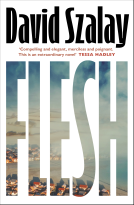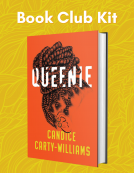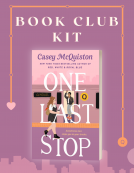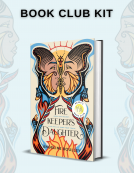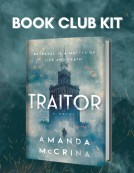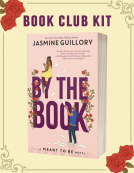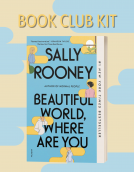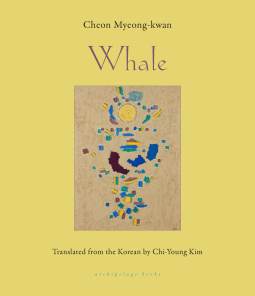
Whale
SHORTLISTED FOR THE INTERNATIONAL BOOKER PRIZE
by Cheon Myeong-Kwan
This title was previously available on NetGalley and is now archived.
Send NetGalley books directly to your Kindle or Kindle app
1
To read on a Kindle or Kindle app, please add kindle@netgalley.com as an approved email address to receive files in your Amazon account. Click here for step-by-step instructions.
2
Also find your Kindle email address within your Amazon account, and enter it here.
Pub Date 2 May 2023 | Archive Date 17 Mar 2023
Talking about this book? Use #Whale #NetGalley. More hashtag tips!
Description
A sweeping, multi-generational tale blending fable, farce, and fantasy--a masterpiece of modern fiction perfect for fans of One Hundred Years of Solitude
Whale is the English-language debut of a beloved and bestselling South Korean author, a born storyteller with a cinematic, darkly humorous, and thoroughly original perspective.
A woman sells her daughter to a passing beekeeper for two jars of honey. A baby weighing fifteen pounds is born in the depths of winter but named “Girl of Spring.” A storm brings down the roof of a ramshackle restaurant to reveal a hidden fortune. These are just a few of the events that set Myeong-kwan Cheon’s beautifully crafted, wild world in motion.
Whale, set in a remote village in South Korea, follows the lives of many linked characters, including Geumbok, an extremely ambitious woman who has been chasing an indescribable thrill ever since she first saw a whale crest in the ocean; her mute daughter, Chunhui, who communicates with elephants; and a one-eyed woman who controls honeybees with a whistle. Brimming with surprises and wicked humor, Whale is an adventure-satire of epic proportions by one of the most original voices in international literature.
Advance Praise
"Told in an omniscient and playful narrative voice, smoothly translated by Chi-Young Kim, this is a distinctly Korean take on Great Expectations, a tale of aspiration and folly punctuated with artisanal bricks and dried fish . . . an affecting theme emerges about the sins of mothers, while philosophical notions broach the comic . . . and the profound . . . The novel succeeds thanks to its multi-sensual atmosphere of strangeness and a conflicted protagonist who simply refuses to accept the mundane."
--Christian House, Financial Times
"A novel that seduces."
--JoongAng Ilbo
"A peerless work devoted to telling a powerful story and lauded for expanding Korean literature into new dimensions."
--The Hankyoreh
"[Whale] redefines what fiction can be."
--The Kyunghyang Sinmun
"Whale overflows with freshness. That's what makes it special."
--OhmyNews
"There has never been a novel like this in Korean literature . . . A novel that's more like reading out loud than reading quietly to oneself; its structure is like that of a folktale. You can feel the oral tradition in the rhythm of the sentences."
--Lee Dong-jin
A spry, cunning work of invigorated tale-telling. Cheon Myeong-kwan harnesses the ferociously erratic flow of shared narratives, embracing their natural disposition toward salacious detail at every turn. Whale is a billowing, boundless novel.
--Justin Walls, Bookshop.org
"Whale gives new meaning to the generation-spanning epic. Cheon expertly inserts metafictional jousts into his stirring prose, sardonically toying with our need for narrative even as he explores his characters' lives with heartfelt urgency. Wonderfully translated by Kim, Whale is an intricate work of art with unexpected riches."
--YZ Chin, author of Edge Case
Available Editions
| EDITION | Other Format |
| ISBN | 9781953861146 |
| PRICE | $22.00 (USD) |
| PAGES | 372 |
Average rating from 40 members
Featured Reviews
With 'Whale' being described online as a satirical short story collection, I wasn't entirely sure whether I was going to like it or not - but boy, was I wrong. 'Whale' is a sprawling, fantastically bizarre family saga that spans decades following mother and daughter who have quite the odd relationship. Myeong-Kwan crafts side characters who are equally as important to the plot as Guembok and Chunhui - a plot that is continually thickening and never ceases to be interesting throughout its entire 400 pages. Normally I don't enjoy a satirical novel, especially if it satiric is subtle, and difficult to discern whether it is being serious or not but Myeong-Kwan is so bold and confident with his satiric writing that I think this is the first time I have ever enjoyed a novel of this sort.
Short stories are not usually my cup of tea but this one was done so artfully and cleverly that it's hard not to love. These stories all are interlinked with the same characters and instead form this huge overarching novel in which everything comes together in the end, with any questions being cleared up and clarified in not one, but TWO epilogues.
Not everything that occurs in this novel is likable - in fact, some instances can be deemed as quite uncomfortable and maybe not all necessary. However, it didn't subtract from the fact that Myeong-Kwan's work is deeply absorbing and sucked me in; I found myself picking this book up at any given opportunity and managed to finish it in a speedy two days. I'd be super interested in reading more of his work if anything else has been translated.
Thank you very much to NetGalley for allowing me to download the PDF of this book.
 Aravind M, Reviewer
Aravind M, Reviewer
The narrative really catches up with us very effectively. There will surely be diverse feelings on this book but all of them would surely have a fresh read, the characters being in their raw form is something very nice to read. The base these characters get is the strongest that I've read in recent times.
The korean popular will surely get a lot of good response in the translated editionz the translation did its best and there was some nice touch to the korean aesthetic that isn't lost in the translation, we will not forget that we are reading a korean book and thats some nice translation for that.
The second that Whale was announced on the longlist for International Booker Prize, it went on my TBR. And when I learned it was still on NetGalley at that point!!! I hopped over there and snagged the PDF. I was not disappointed. Whale is a beautiful story, winding in scope, cleverly told and translated, and absolutely enchanting.
Chunhui, a mute woman known for her size and uncommon strength, returns to the abandoned brickyard her family once owned, after being released from prison. And she begins to restore it and make bricks. How did this happen? How did she get here? The story begins before Chunhui was born, first with her mother Geumbok’s travels, business acumen, and beauty, and even before that, an old crone living in a rundown house in the village Pyeongdae. We go back through their stories to get to Chunhui’s.
These characters are so bright, and also timeless. I felt like I was reading a time-honoured epic, and it was so twisty and detailed, but never draggy or difficult. Definitely spectacular.
 Reviewer 1115066
Reviewer 1115066
By turns fascinating, disgusting, horrifying and compelling - one of the most interesting and unique offerings from the International Booker longlist. Thank you to the publisher and netgalley for a free ebook in exchange for an honest review.
Cinematic and fantastical, the satirical Whale is a dark fairy-tale exploring South Korea’s social and economic evolution in the wake of the Korean War. With larger than life characters, this novel mixes violence with black humour for an unsettling, yet engrossing read.
 Meike S, Media/Journalist
Meike S, Media/Journalist
This book is full of contradictions, and I'm here for it: I HATE meandering novels, and this one meanders quite a bit - but I was still intrigued, because the over-the-top characters and storytelling are captivating. It's also both brutal and hilarious, and it employs magical elements to better illustrate reality, so all in all: ambitious stuff, and that's what the International Booker should highlight. Cheon Myeong-kwan's debut novel was first published in 2003, so it's 20 years old and already considered a contemporary classic in South Korea. Tackling the topic of societal transformation (in this case from pre- to post-modern capitalist society), it has been compared to Great Expectations as well as One Hundred Years of Solitude.
The tale focuses on three women and how they navigate changing circumstances while one aspect remains the same: Sexism. Protagonist Geumbok flees her bleak live in a rural area and enters relationships with men who help her survive and then rise in the social ranks. The business-savvy, matter-of-fact woman adapts to the expanding capitalist system by starting several enterprises, the most ambitious one being the cinema in the form of the title-giving whale. Geumbok tortures and neglects the second protagonist, her mute daughter, who gets a storyline of her own. Then, we have a one-eyed woman who directs an army of bees, born into another female line of family trauma. These three narrative strands are intertwined with minor stories about other characters (the most important one being a gangster with a scar), and it's fascinating how the author maintains control of this sprawling concept.
Cheon Myeong-kwan anchors his story with historical references that illustrate political turmoil and the changing social climate during the Fifth and Sixth Republic, but juxtaposes this with (intentionally) implausible twists and turns as well as magical elements that still serve to illustrate the social criticism the text intends to deliver. The language is rather plain, which helps to keep track of the multi-layered action that keeps coming back to the question how women survive in an antagonistic, merciless climate, how society judges them, and how they punish each other for their experiences.
An intriguing read, and a good choice for the International Booker.
What a wild book! Whale was an interesting surreal ride to take. I liked the backstory of mother and daughter as well as all the different characters introduced throughout the book. It was quick to read.
 Reviewer 1007896
Reviewer 1007896
Whale is the type of novel that creates in you the need to talk and discuss everything that occurs inside its pages.
Women and men alike suffer in this novel. They suffer physical, sexual and psychological abuse. If you have a hard time reading about these topics, beware. Huge trigger warning for violence and all types of abuse.
However, if you give it a chance you will find yourself in a world full of interesting stories which are interconnected to create this magical novel. It is written as a kind of mythological/folklore tale, it has this magical background that gives you some distance from the horrible things that happens to the characters.
There are all kinds of relationships mother-daughter, father-daughter, man-wife and all kinds of different friendships that come to be because of surreal situations.
Whale is shortlisted for the International Booker Prize and I think is well deserved.
Thank you Netgally for the chance to read it.
Whale is an exciting and funny novel set in South Korea. It tells the story of Geumbok, a determined woman, her daughter Chunhui, who can't speak, and a woman with one eye who controls honeybees. The novel is filled with surprises and humour and gives a fresh perspective on Korea's transition from the past to the present. The story starts in a small village, where Geumbok grows up in poverty but manages to succeed through her wit and determination. Her daughter Chunhui, who can only communicate with elephants, faces loneliness and works in a brickmaking factory. The bond between these two women and their struggles reflect the challenges faced by women in Korean society.
The story combines elements of adventure and satire, with a touch of magic, to explore Korean history and culture. It's like a larger-than-life fairy tale that takes readers on a journey through time. The whale is a symbol that appears throughout the book, representing Geumbok's desire for something greater and the unfulfilled dreams of the characters. The magical realism style is also reminiscent of acclaimed authors such as Gabriel García Márquez or Eka Kurniawan, with their witty mix of fantasy and historical events, creating a unique reading experience. It's like watching an amazing film, which is not surprising considering the author's background in filmmaking (as happens, film is also a leitmotif that fills in the story other than whale).
Whale also captures the essence of "han," a Korean concept of deep-seated emotions like rage, grief, and sorrow. It adds depth to the story, reflecting the characters' internal struggles and the Korean cultural identity. Whale doesn't shy away from depicting violence and brutality. While these scenes may be disturbing, they serve a purpose in showing the challenges faced by the characters and their pursuit of justice. The novel has elements of revenge, as the characters seek retribution for the injustices they face.
I frequently got lost in the middle of reading it. Not getting lost in the sense of missing the plots or scenes, but more like absorbed in the story. The absurdities of the plots often left me uncertain about which stage of the book I was in, yet it didn’t really matter. Throughout the book, there are many memorable moments and images that tug at the heartstrings. One touching scene is when Chunhui imagines talking to Jumbo the Elephant, her only friend. It's a mix of sadness and sweetness that brings tears to my eyes. Whale is a captivating and moving novel that explores Korean history, mother-daughter bonds, and the human spirit.
Update: I read it. It did not win, unfortunately. The other one I thought it was likely to take the honors did. Too bad I dis not enjoy it as much as this one.
Shortlisted for the International Booker prize 2023
I am still reading the novel but I wanted to write a few words about it before the winner is announced Tomorrow. I think the novel has the best chances to win. I loved Boulder more but I am not sure it will win. This one epic, longer and “big” in every way, from the themes explored to the writing style and plot.
“Life is sweeping away the dust that keeps piling up, as she mopped the floor with a rag, and sometimes she would add, Death is nothing more than dust piling up.”
As the writer said in an interview, he did not exactly know what he wanted to read so he put all his ideas in one book. What resulted is the epic fantastic history of a few women. The novel starts in the present with the release from prison of Chunhui, who returns to the ruins of her village. Then we move to a few generation into the past where we begin to follow the destiny of different
characters until we return in the present back to Chunhui. Some of the themes the author discusses are fate, ambition, loss, love, gender struggles, politics, and motherhood. It is a story about big things, big lives, big loves, big turns of fate. It is quite exciting and rich.
I picked up WHALE after it was nominated for the International Booker Prize, and I was pleased to see that it made it to the shortlist - a well-deserved honor. WHALE is a Korean generational epic, a tale spun with magic realism, telling the tale of 3 generations of women in rural Korea.
The book begins with the return of Chunhui, a mute young woman, to the ruins of her village after a stay in prison. We then spin back in time to her mother Geumbok, who overcame poverty to become a wealthy entrepreneur in a patriarchal society, and move forward, tracing the rise and fall of her fortune as Korea undergoes modernization, until we reach the present day once more. Throughout the entire tale is interspersed an author's chorus beginning "This/That was the law of..." which conveys a sense of fate and inevitability. The cast of characters contains certain deliberate tropes - the con man/smuggler/pimp, the poor man with a heart of gold - who give the story a fairy tale-like feel.
The book that comes to mind as a comparison is Gabriel Garcia Marquez's ONE HUNDRED YEARS OF SOLITUDE - though the tone of the two books is very different - SOLITUDE being almost a dream-like magical realism in comparison to WHALE's earthy, uninhibited one. This doesn't always make for easy, pleasant reading - but it is undeniably captivating.
 Reviewer 354493
Reviewer 354493
I love multigenerational stories and stories drawing on folklore and magical realism and the like, so this one I thoroughly appreciated! Capturing Korean history and the journeys and struggles of its characters across a changing period, it didn’t always make for pleasant reading but was a story that impressed itself upon me all the same.
Readers who liked this book also liked:
We Are Bookish
Literary Fiction, Multicultural Interest, Women's Fiction
We Are Bookish
Mystery & Thrillers, OwnVoices, Teens & YA
We Are Bookish
Biographies & Memoirs, Nonfiction (Adult), Parenting, Families, Relationships
We Are Bookish
Multicultural Interest, Mystery & Thrillers, Teens & YA
We Are Bookish
Arts & Photography, Health, Mind & Body, OwnVoices
We Are Bookish
General Fiction (Adult), Romance, Women's Fiction
We Are Bookish
Historical Fiction, Mystery & Thrillers, Teens & YA
We Are Bookish
Business, Leadership, Finance, Nonfiction (Adult), Self-Help
We Are Bookish
General Fiction (Adult), Romance, Women's Fiction
We Are Bookish
General Fiction (Adult), Literary Fiction, Women's Fiction

